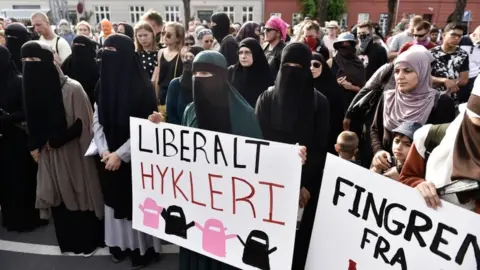Denmark veil ban: First woman charged for wearing niqab
 AFP
AFPA woman has become the first person in Denmark to be charged with wearing a full-face veil in public, after a ban came into effect on Wednesday.
The 28-year-old came to the police's attention when a scuffle broke out between her and another woman at the top of an escalator at a shopping centre north of Copenhagen.
She was fined when she refused to remove the veil.
The new law has provoked protests and criticism from human rights groups.
It does not mention burkas and niqabs by name, but says "anyone who wears a garment that hides the face in public will be punished with a fine".
An initial report into the altercation on Friday suggested that one woman was trying to remove the other's veil, but police said this was not clear.
"During the fight her niqab came off, but by the time we arrived she had put it back on again," police spokesperson David Borchersen told the Ritzau news agency.
Police reviewed CCTV footage to determine whether the second woman had intentionally pulled off the veil, and believed it was incidental to the fight.
They said both women were charged with violating the peace and said one had also been charged with violating the full-face veil law.
She was given a 1,000 kroner fine ($155; £120) after refusing to take it off at their request.
 EPA
EPAOn Wednesday night protesters gathered in the capital to demonstrate against law, with women in traditional burqas and veils standing alongside people with makeshift coverings.
Friday's incident is reported to have taken place at a shopping centre in Horsholm, 25km (15 miles) north of Copenhagen.
 Reuters
ReutersSome Muslim women have said they will not adhere to the law - which carries a 10,000 ($1,500; £1,200) kroner penalty for repeat offenders.
Human Rights Watch has labelled the ban "discriminatory" and said it was the "latest in a harmful trend."
Last year the European Court of Human Rights upheld a similar Belgian ban, saying that communal harmony trumped an individual's right to religious expression.
Full or partial bans are also in place in France, Austria, Bulgaria and the German state of Bavaria.
